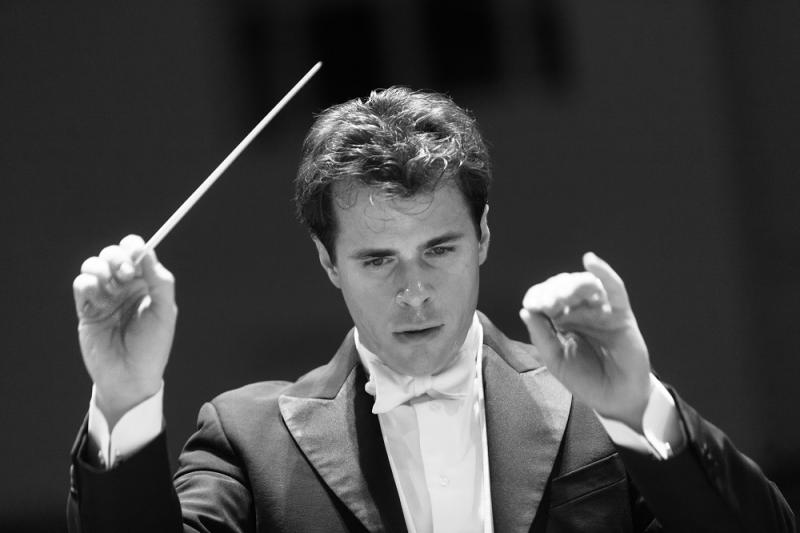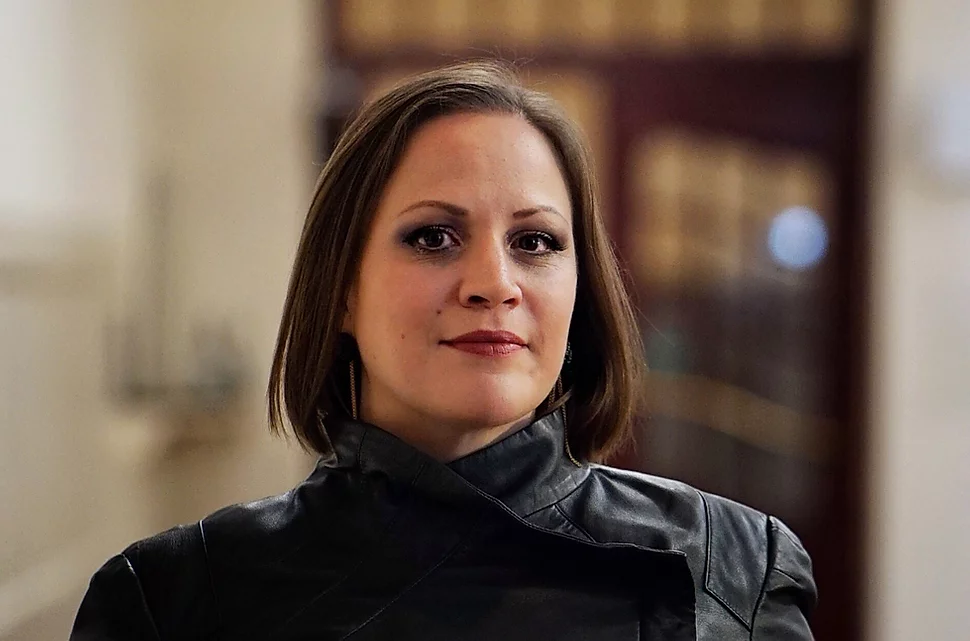Mahler's 'Resurrection' Symphony, Philharmonia, Hrůša, RFH review - big picture, stunning details | reviews, news & interviews
Mahler's 'Resurrection' Symphony, Philharmonia, Hrůša, RFH review - big picture, stunning details
Mahler's 'Resurrection' Symphony, Philharmonia, Hrůša, RFH review - big picture, stunning details
Transcendent idylls matter as much as great blazes in this broad view

So many performances of Mahler's most theatrical symphony every season, so few conductors who have something radically fresh to say about it.
The breadth of Hrůša's interpretation – the polar opposite of the last "Resurrection" I heard, Gianandrea Noseda's lightning whizz with the brand-new Pan-Caucasian Youth Orchestra in Georgia – altered perspectives. Usually the first extended vision of heaven we get is in the fourth-movement song based on a folk poem, "Urlicht" ("Primeval Light"), as good as any I've heard here – Jennifer Johnston (pictured below by R T Dunphy) producing the authentic frisson with her pitch-altering first entry after the pell-mell human comedy of the Scherzo, fuller voiced than usual in the upper register, the true contralto. Equally levitational here, however, were the vision that offsets the "funeral rites" at the heart of the first movement, flecked with expressive colour from superlative young oboist Tom Blomfield (a star in the Philharmonia's recent performance of Strauss's Oboe Concerto), cor anglas player Maxwell Spiers and first horn Nigel Black, haloed by softest strings, and the whole of what usually comes over as the "old-fashioned" minuet sequel.
Here hyper-sensitive strings made us hold our breath through each Schubertian round-dance and Hrůša extracted the heavenly humour from the heavenly music-box sequence of pizzicati, piping piccolo and very present harps.It's also worth remembering that like his great mentor, Jiří Bělohlávek, Hrůša hails from the same part of the world as Mahler – not for nothing did Bělohlávek claim the composer as a true Czech – so the moments of rustic wonder do somehow leap out.
Every orchestral principal rose to difficult challenges with compelling individuality, supremely so first trumpeter Christian Barraclough (his offstage counterpart, Jason Evans, touched the metaphysical, too, with two notes at the last trump, magically echoed as ever by the flute family playing at nightingales). Collective punches were never pulled, right from the electrifying opening, and the doomy marching didn't outstay its welcome, even if the Last Judgment hordes were still the aural equivalent of D W Griffiths meeting Keystone Cops.
Then the pianissimo choral entry with the Resurrection Ode - has it ever sounded more mystical? At the other end of the dynamic scale, the men had all the heft of a Welsh male-voice choir. At last the City of Birmingham Symphony Chorus have a rival in a work they've owned, up to now. Soprano Camilla Tilling wasn't in best voice for the rising from the masses, the one less than perfectly articulated sequence; but in the bigger picture and the great final blaze, seismically rocked by the double-basses, that was soon forgotten. And what a joy, at last, to see orchestral musicians showing visible pleasure in their colleagues' work.
rating
Share this article
Add comment
The future of Arts Journalism
You can stop theartsdesk.com closing!
We urgently need financing to survive. Our fundraising drive has thus far raised £49,000 but we need to reach £100,000 or we will be forced to close. Please contribute here: https://gofund.me/c3f6033d
And if you can forward this information to anyone who might assist, we’d be grateful.

Subscribe to theartsdesk.com
Thank you for continuing to read our work on theartsdesk.com. For unlimited access to every article in its entirety, including our archive of more than 15,000 pieces, we're asking for £5 per month or £40 per year. We feel it's a very good deal, and hope you do too.
To take a subscription now simply click here.
And if you're looking for that extra gift for a friend or family member, why not treat them to a theartsdesk.com gift subscription?
more Classical music
 Hallé John Adams festival, Bridgewater Hall / RNCM, Manchester review - standing ovations for today's music
From 1980 to 2025 with the West Coast’s pied piper and his eager following
Hallé John Adams festival, Bridgewater Hall / RNCM, Manchester review - standing ovations for today's music
From 1980 to 2025 with the West Coast’s pied piper and his eager following
 Kaploukhii, Greenwich Chamber Orchestra, Cutts, St James's Piccadilly review - promising young pianist
A robust and assertive Beethoven concerto suggests a player to follow
Kaploukhii, Greenwich Chamber Orchestra, Cutts, St James's Piccadilly review - promising young pianist
A robust and assertive Beethoven concerto suggests a player to follow
 Robin Holloway: Music's Odyssey review - lessons in composition
Broad and idiosyncratic survey of classical music is insightful but slightly indigestible
Robin Holloway: Music's Odyssey review - lessons in composition
Broad and idiosyncratic survey of classical music is insightful but slightly indigestible
 Classical CDs: Wolf-pelts, clowns and social realism
British ballet scores, 19th century cello works and contemporary piano etudes
Classical CDs: Wolf-pelts, clowns and social realism
British ballet scores, 19th century cello works and contemporary piano etudes
 Bizet in 150th anniversary year: rich and rare French offerings from Palazzetto Bru Zane
Specialists in French romantic music unveil a treasure trove both live and on disc
Bizet in 150th anniversary year: rich and rare French offerings from Palazzetto Bru Zane
Specialists in French romantic music unveil a treasure trove both live and on disc
 Scottish Chamber Orchestra, Ibragimova, Queen’s Hall, Edinburgh review - rarities, novelties and drumrolls
A pity the SCO didn't pick a better showcase for a shining guest artist
Scottish Chamber Orchestra, Ibragimova, Queen’s Hall, Edinburgh review - rarities, novelties and drumrolls
A pity the SCO didn't pick a better showcase for a shining guest artist
 Kilsby, Parkes, Sinfonia of London, Wilson, Barbican review - string things zing and sing in expert hands
British masterpieces for strings plus other-worldly tenor and horn - and a muscular rarity
Kilsby, Parkes, Sinfonia of London, Wilson, Barbican review - string things zing and sing in expert hands
British masterpieces for strings plus other-worldly tenor and horn - and a muscular rarity
 From Historical to Hip-Hop, Classically Black Music Festival, Kings Place review - a cluster of impressive stars for the future
From quasi-Mozartian elegance to the gritty humour of a kitchen inspection
From Historical to Hip-Hop, Classically Black Music Festival, Kings Place review - a cluster of impressive stars for the future
From quasi-Mozartian elegance to the gritty humour of a kitchen inspection
 Shibe, LSO, Adès, Barbican review - gaudy and glorious new music alongside serene Sibelius
Adès’s passion makes persuasive case for the music he loves, both new and old
Shibe, LSO, Adès, Barbican review - gaudy and glorious new music alongside serene Sibelius
Adès’s passion makes persuasive case for the music he loves, both new and old
 Anja Mittermüller, Richard Fu, Wigmore Hall review - a glorious hall debut
The Austrian mezzo shines - at the age of 22
Anja Mittermüller, Richard Fu, Wigmore Hall review - a glorious hall debut
The Austrian mezzo shines - at the age of 22
 First Person: clarinettist Oliver Pashley on the new horizons of The Hermes Experiment's latest album
Compositions by members of this unusual quartet feature for the first time
First Person: clarinettist Oliver Pashley on the new horizons of The Hermes Experiment's latest album
Compositions by members of this unusual quartet feature for the first time

Comments
Which concert were you at?
I sense there's not going to
I sense there's not going to be much finding of a middle way here, but let me assure you that neither in person nor as a conductor is Hrůša a flash merchant (though Mahler, in this symphony, often is). Try his Brahms; ask players what they think, and the response of the ones I know will be the opposite to you. Your last sentence clearly lacks any humility, but it's your opinion.And you didn't read either the review or your programme properly: I compared the Philharmonia Chorus to the CBSO Chorus, but it was, naturally, the former performing, not the latter.
I was at the same concert as